Guelph, ON – Horses are highly adapted performance animals, but one unexplained adaptation "a delicate gastrointestinal tract" is their Achilles heel.
As in humans, horses' stomachs contain acid to digest and break down their food and mucus to protect the stomach wall against the acid. But for a vaguely inexplicable reason, horses lack mucus in the upper half of their stomach. This causes all sorts of issues, including gastric ulcers.
In fact, gastrointestinal diseases are the leading cause of death in horses.
“If acid splashes up, or their stomach is empty, it can really damage a horse’s stomach,” explains Jennifer MacNicol, a PhD candidate in the Department of Animal Biosciences. “But what if we can keep food in there longer and potentially buffer that splashing, or use nutraceuticals to reduce acid production or increase mucus production?”
Her research seeks to “determine what makes a horse’s gastrointestinal tract tick,” and to investigate the effectiveness of nutraceuticals proposed by industry.
Jennifer, who was awarded a prestigious Vanier Canada Graduate Scholarship through the Natural Sciences and Engineering Research Council, is also working to create an in vitro protocol to test nutraceuticals before animal trials.
An in vitro protocol simulates digestion in different compartments of a stomach. She hopes this will be a less invasive way to conduct equine research.
“I think as scientists we have an obligation that if we use live animals, we need to make sure they are the most directed and valuable studies,” Jennifer says. “I want to develop strong and robust in vitro methods so that we can do a lot of things before taking it into the live animal.”
More information on Jennifer’s research is available at uoguelph.ca/oac/horses-stomach
by Stephanie Craig, for Equine Guelph

 USA
USA Canada
Canada Australia
Australia New Zealand
New Zealand Europe
Europe UK / IRE
UK / IRE


